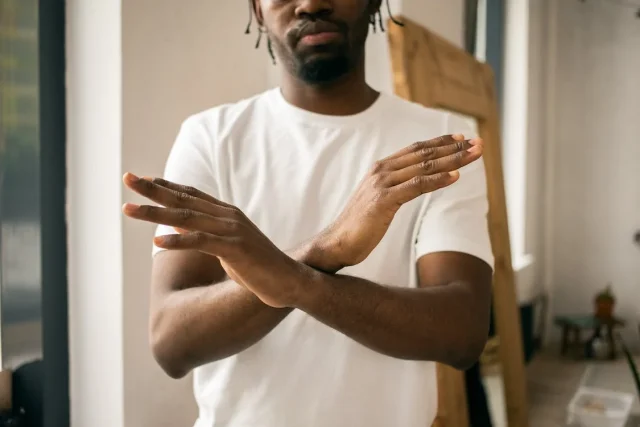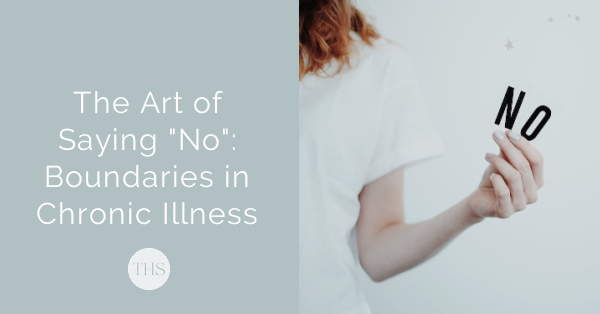Why You Need a ‘Not Now’ List in Your Life

Saying “no” can be difficult if you’re living with a chronic illness and depend upon the care and goodwill of others. It’s easy to feel guilty when rejecting unreasonable requests and you may feel like a permanent party-pooper when taking steps to reduce overwhelm in your day-to-day life.
However, setting boundaries is crucial if you want to promote self-care and self-advocacy. Saying “no” is not necessarily negative, either. Turning down opportunities ensures that you have the time and energy to pursue activities and experiences that mean a lot to you.
That said, a blunt “no” is unlikely to win you any favors. Instead, try to perfect the art of saying “no” by learning to empathize with other people and craft rejections that are both assertive and kind.
Turning down invitations and ignoring requests for help never feels good. However, if you’ve been living with a chronic illness for some time, you probably need to say “no” from time to time. This can be particularly challenging if you live with an invisible illness as folks may not understand why you need time to yourself.
However, saying “no” regularly is actually a sign of healthy relationships. It’s a sign that your friendship is secure enough to handle rejection and that neither side feels guilty about participating. This kind of secure, stable friendship can be really powerful if you’re used to relationships based on blame and criticism.
Work up to saying “no” more often by building healthier relationships with your friends and family. Healthy relationships can help you develop your self-esteem, improve the quality of the time that you spend together, and make it easier to build connections that support your well-being. This can reduce stress in your life, improve your ability to manage chronic illness, and may even encourage you to take on more healthy habits.
Start by setting aside time for the other person. This may be tricky depending on your illness, but the act of creating time shows that you authentically care about your relationship. Try to plan something fun for this time, too. Even simple activities, like pulling out crochet needles or paints, can improve the quality of your time together.
Bear in mind that you do not need to remain friends with folks who bring you down. Do not make time for people who undermine your confidence and set clear boundaries with folks who cause you distress. This makes more time for the people who bring you happiness and will help you become more assertive.

Assertiveness can be a difficult trait to build if you’re low on self-esteem and struggle to prioritize yourself due to chronic illnesses. However, developing assertiveness is key if you want to set boundaries and foster healthier relationships.
Being assertive doesn’t necessarily mean you have to create conflict with your loved ones, either. Standing up for yourself is just a sign that you care enough about yourself to prioritize your own needs from time to time. However, you may find it difficult to say “no” and stand up for yourself if you’re new to the idea of assertiveness.
Sometimes, the best way to practice assertiveness is simply to pull back from a relationship or a commitment. Some people simply don’t understand “no” and will not change their behavior even after you’ve made it clear that you are uncomfortable. Removing yourself from a toxic situation is an important form of self-advocacy that promotes your well-being and helps you focus on more important relationships.
Assertiveness is also a big part of indulging your passions day-to-day. The activities and hobbies you’re passionate about are very important for your mental and physical health. By asserting your boundaries and saying no when necessary, you’ll empower yourself to stick to a schedule, focusing on one thing at a time and blocking out distractions.
Saying “no” is an important skill that improves your relationships and helps reduce your stress. Sometimes, however, there’s a better alternative than a straightforward “no”.
Take a leaf out of the improv playbook by saying “Yes, and” rather than “no”. The “Yes, and” rule helps you make space for your own needs and priorities when folks ask you if you want to eat out, catch a movie, or go on vacation together. Saying “Yes, and” ensures that you do not passively accept (or reject!) people’s requests and ensures that you are a co-collaborator rather than a participant in your relationships.
For example, if you’re approaching retirement age and your best friend wants to take you on vacation, find ways to say “Yes, and” rather than a flat “no”. This can help you stay safe while traveling as a senior and will ensure that you have time to manage your chronic illness while on vacation. For example, if you’re on holiday in Paris, you can “Yes, and” your friend with a conversation like:
Friend: “I’d like to visit the Louvre and the Eiffel Tower today”
You: “Yes, and I’d like to make time for frequent breaks to avoid overexertion, take my medication, and improve my hydration”.
Apply this idea during the planning phase, too. You can avoid discomfort by using “Yes, and” to find a destination with adequate mobility considerations and make time for medical check-ins before you leave. This example ensures that you can adapt to change without rejecting exciting experiences automatically while ensuring that your own needs are met, too.
Just remember that “Yes, and” isn’t always appropriate. If you’re truly burnt out or need to reassert boundaries, a firm “no” is always acceptable. True friends will understand your need for some alone time and will not press you to forgo your priorities.

Saying “no” is a great way to build your boundaries and improve self-care when living with a chronic illness. Start by building healthier relationships built on mutual respect and love. This will make saying “no” that much easier, as you know that your relationship is secure enough to handle some time apart.
For more advice on how to communicate your physical limitations clearly but kindly, check out this article. Also read more about how you can maintain some independence when you rely on others for practical support.